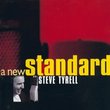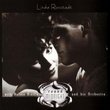| All Artists: Giuseppe Verdi, Lamberto Gardelli, Wiener Staatsopernorchester, Anna D'Auria, Bruno Prevedi, Carlo Cava, Dora Carral, Elena Suliotis, Giovanni Foiani, Tito Gobbi, Walter Krautler Title: Verdi: Nabucco Members Wishing: 2 Total Copies: 0 Label: Decca Release Date: 9/10/2002 Album Type: Original recording reissued Genre: Classical Style: Opera & Classical Vocal Number of Discs: 2 SwapaCD Credits: 2 UPCs: 028941740724, 028941740724 |
Search - Giuseppe Verdi, Lamberto Gardelli, Wiener Staatsopernorchester :: Verdi: Nabucco
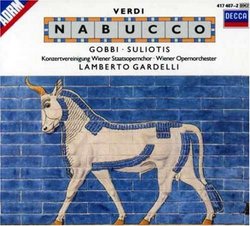 | Giuseppe Verdi, Lamberto Gardelli, Wiener Staatsopernorchester Verdi: Nabucco Genre: Classical
Nabucco (the real name is Nabucodonosor, but no opera lover ever uses it) was Verdi's first big international success and got him back on the track composing operas after a series of family tragedies had made him decide to... more » |
Larger Image |
CD DetailsSynopsis
Amazon.com Nabucco (the real name is Nabucodonosor, but no opera lover ever uses it) was Verdi's first big international success and got him back on the track composing operas after a series of family tragedies had made him decide to stop. It has one of his all-time hits, the great chorus "Va, pensiero," and a melodramatic story of a love triangle set against the background of the conquest of Jerusalem by Nebuchadnezzar and the Hebrews' "Babylonian captivity." Tito Gobbi, one of the century's great singing actors, had aged vocally by the time this recording was made, but still powerfully portrays the Assyrian king who defies God, is driven mad, and recovers his sanity just in time to save the Jewish slaves and the young lovers from a mass execution. The cast and conducting are variable though generally good--with Elena Suliotis giving a burned-out, Callas-imitating performance--but this show is essentially Gobbi's. --Joe McLellan Similarly Requested CDs
|
CD ReviewsEarly Verdi at its Best D. Bennett | 10/17/2005 (5 out of 5 stars) "Nabucodonosor (Nabucco) is a hugely attractive role for dramatic baritones such as Tito Gobbi;the entire role is wionderfully emotive, not least his Mad Scene and a wonderful duet with Abigaille. Gobbi was still in good voice in 1965 - he is even better here that in his second Tosca recording with Callas - his portrayal oozes with class and his use of Italian is inspired. Abigaille is sung by Elena Souliotis. I disagree with Joe McLellan's review over Souliotis' portrayal. 1) That she is "burned-out" - although I would agree with this description for Souliotis later in her career for she did ruin her voice early on - I would emphatically not say that about this recording - her finest moment in the studio in my opinion, and certainly in her 'prime'. 2) That she was imitating Callas - Every dramatic soprano singing Abigaille sounds similar in that blazing high notes and wonderful chest notes are all part and parcel with the role's requirements- I feel that Souliotis sounds much like Dimitrova (Sinopoli) and many other dramatic sopranos in the role besides Callas -- maybe ALL the sopranos copied Callas?...I think not. The rest of the cast are very vivid and - although rather less starry than on Sinopoli's version e.g. Domingo, Lucia Popp - they give very fine portrayals and the chorus is, thankfully, superb - "Va pensiero!" is one of many highlights. Gardelli is the equal of Riccardo Muti in terms of conducting and quite an improvement over Sinopoli who makes the opera sound very bombastic. My recommendations for Nabucco are: 1) Gobbi, Souliotis with Gardelli (best overall) 2) Manuguerra, Scotto with Muti (a very exciting recording) 3) Cappuccilli, Dimitrova with Sinopoli (Cast generally very fine especially Cappuccilli but Sinopoli is not best conductor) Highly recommended" The Nabucco to which all others are measured! Armindo | Greece | 08/13/2001 (5 out of 5 stars) "Finally, amazon releases this 1965 in great sound quality decca Nabucco. Though I admire the later DG version with the grand Ghena Dimitrova as Abigaille, this earlier account remains my favourite. First and foremost its leading soprano, Elena Soulioti is heard here at her very best! I really couldn't get enough of her glorious, powerful, yet beautiful voice not to mention the pathos with which she performed! Many accused her of trying to imitate Maria Callas and though Elena does use some of Callas' tricks, chest notes for example, her instrument has something Callas never had: beauty. Elena nails the high notes perfectly and right after that, she sings warmly and gently (Ben io t'invenni...Anch'io dischiuso un giorno). The "salgo gia del trono aurato.." follows and offers unrivalled excitement! In my opinion, had Souliotis been more careful those years (had she avoided performing roles like Abigaille and Lady Macbeth so often, despite that these were the roles she was born to sing), she would have become greater than Callas even if this does sound a bit too much to say. Like Elena IS Abigaille there is no doubt that Gobbi IS Nabucco. In spite of the fact that he recorded the role somewhat late in his career one can still hear what a great actor and singer he was! Listen to his duet with Abigaille "Deh perdona" and you can feel the chemistry between them. He enriched each role with his special touch and Nabucco was no exception! The rest are also great but this is a Souliotis-Gobbi show! Conductor Gardelli is superb and adds this Nabucco to his famous, supreme early-Verdi recordings (mostly available by Philips) On the whole, this is the definite Nabucco recording that should be in every opera collection." Still the best "Nabucco" after forty-four years Ralph Moore | Bishop's Stortford, UK | 04/03/2009 (5 out of 5 stars) "Two excellent reviews on Amazon.com make too much comment from me redundant but having only just acquired the set after resisting it for many years, I'll add my endorsement to the previous reviewers' sound and perceptive comments.
I suppose I did not listen carefully to this recording sooner because I feared that Suliotis (or "Souliotis", as she later styled herself) was too wild and uneven and Gobbi too close to the end of his career. It is true that he is a little dry and bleak of voice up top, but that had been the case for several years by 1965 and it does not stop him from delivering a typically nuanced and incisive characterisation of a part tailor-made for his voice - and sometimes the sheer vocal quality is still impressive, in both declamatory and softly-sung passages. Suliotis is literally terrific; no other Verdi rôle apart from Lady Macbeth could have suited her better. She exploits the break between her registers to huge dramatic effect: the lower register is cavernous and commanding, the top notes laser-like in intensity even though the voice isn't properly "joined up". The supporting cast, while not as starry as that of the more recent Sinopoli recording, is more than adequate; Carlo Cava's Zaccaria and Giovanni Foiani's High Priest are two basses who deserve special mention - and the basses in the Wiener Staatsopernchor are particularly resonant, too. I still enjoy the Sinopoli version, too, although some find his direction too frenetic and disjointed. There is also the hard-driven Muti account (see my review); although I always enjoy Manuguerra's refined baritone, Scotto's screechiness is a trial to some, for all her artistry." |

 Track Listings (14) - Disc #1
Track Listings (14) - Disc #1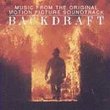



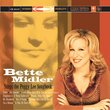
![Frida [Music from the Motion Picture]](https://nationalbookswap.com/cd//m/64/2164/612164.jpg)


